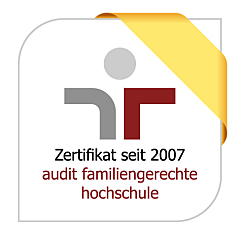Job Vacancies
Research Assistant (PhD position) (f/m/d)
Marum Center for Marine Environmental Sciences at the University of Bremen
Classifications E 13 - part-time 75%
Reference number: A287-24
Closing date: 10/08/2024
Public vacancy


MARUM - Center for Marine Environmental Sciences at the University of Bremen, is offering a position for a
Research Assistant (PhD position) (f/m/d)
from the earliest possible date limited for 48 months
German pay scale E13 TV-L (75%)
The limited term is for academic qualification according to § 2 para. 1 WissZeitVG (Wissenschaftszeitvertragsgesetz). Accordingly, only applicants who still have the corresponding number of qualification periods in accordance with § 2 para. 1 WissZeitVG can be considered.
Job description
MARUM is an internationally recognised center for marine environmental research with a focus on the geosciences, anchored as Research Faculty at the University of Bremen. MARUM provides an ideal environment for PhD students to become excellent in their field of expertise and to develop their personal skills to further their career. MARUM offers rich opportunities for transdisciplinary exchange and collaboration across different disciplines. PhD students can make use of coaching and mentoring offers as well as a dedicated course and training programme.
MARUM takes part in the large-scale international project AEGIS (Ancient Environmental Genomics Initiative for Sustainability), an effort coordinated by the University of Copenhagen and involving ten institutions across Europe, South Korea and the United States. Modern agricultural practices have built cropping systems that maximise yields in today’s climate, but lack genetic and organismal diversity and resilience to rapid climatic and environmental change. However, a rich record of past capabilities survives in sedimentary records as ancient biomolecules, including environmental DNA (eDNA). The main idea behind AEGIS is to tap into this vast archive to retrieve genetic and organismal information from the past and use nature’s own solutions to different climates as a means for improving future food sustainability.
Within this project the task of the PhD student will be to characterize the climatic development during the domestication, cultivation and breeding of ancient and modern crops from the Late Pleistocene to modern times. A spatial focus will be on lake and wetland systems in the Fertile Crescent, with possibilities to incorporate study sites across continental Europe and on Iceland. The project will apply organic-geochemical and isotopic methods for reconstructing temperature and water availability, and will investigate novel and established molecular tracers for human activity and specific plant inputs. It is expected that the PhD student takes part in the implementation and further development of these techniques. Good communication with project partners such a (bio)geochemists, (paleo)ecologists, (paleo)climatologist, archaeologists, and geneticists is expected.
The specific tasks include:
- Establish the regional climatic and environmental history of the Fertile Crescent, from the context of diverse samples and data
- Identify changes in plant-specific contributions linked to climatic and anthropogenic factors
- Publications in high-ranked scientific journals and presentations at international conferences
- Communicating and collaborating with local and international project partners, independent organisation of lab work
Requirements
- Completed scientific university degree (Master's degree / university diploma) in Geosciences, Chemistry, Environmental Sciences, or similar
- Prior experience in Paleo-Climatology and/or Organic Geochemistry
- Skills in Gas- or Liquid-Chromatography, Mass-Spectrometry, and compound-specific stable isotope analyses are advantageous
- Self-motivation, creativity, independent thinking and interest in method development
- Proficiency in English, proven writing skills
General Information
Open to unconventional approaches in research and teaching, the University of Bremen has retained its character as a place of short distances for people and ideas since it was founded 50 years ago. With a broad range of subjects, we combine exceptional performance with great potential for innovation. As an ambitious research university, we stand for the approach of research-based learning and a pronounced orientation towards interdisciplinarity. We actively organise scientific cooperation worldwide in a spirit of partnership.
Today, around 23,000 people learn, teach, research and work on our international campus. In research and teaching, administration and operations, we are firmly committed to the goals of sustainability, climate justice and climate neutrality. Our Bremen spirit is expressed in the courage to try new things, in supportive cooperation and in respect and appreciation for one another. With our study and research profile and as part of the European YUFE network, we assume social responsibility in the region, in Europe and the world.
At MARUM, PhD students are supervised by a team of experienced scientists. Additional training and support is provided by the Bremen International Graduate School for Marine Sciences, GLOMAR (https://www.marum.de/research-training.html). These offers include a training programme with specialist courses that take the diversity of marine science disciplines into account, as well as soft skills training to supplement the PhD students' training.
The University of Bremen is family-friendly, diverse and sees itself as an international university. We therefore welcome all applicants regardless of gender, nationality, ethnic and social origin, religion/belief, disability, age, sexual orientation and identity.
The University of Bremen endeavours to increase the proportion of women in the academic field and therefore expressly encourages women to apply.
Disabled persons with essentially equal professional and personal qualifications will be given preferential consideration.
Further information regarding the position can be obtained from Dr. Enno Schefuß (eschefuss@marum.de) or Dr. Lars Wörmer (lwoermer@marum.de). Your applications should contain (i) your CV, (ii) copies of relevant documents including your MSc thesis, (iii) statement of research interests in the context of project, and (iv) contact information of two references. We look forward to receiving your application with the above-mentioned documents under the reference number A287-24 by 08.10.2024 as a single PDF file by unencrypted e-mail to bewerbung-a28724protect me ?!marumprotect me ?!.de or by post to:
Dr. Enno Schefuß
MARUM – Zentrum für Marine Umweltwissenschaften
Universität Bremen
Postfach 33 04 40
D-28334 Bremen
We kindly ask you to send us only copies (no portfolios) of your application documents, as we cannot return them. They will be destroyed after the selection process has been completed. Application costs cannot be reimbursed.
